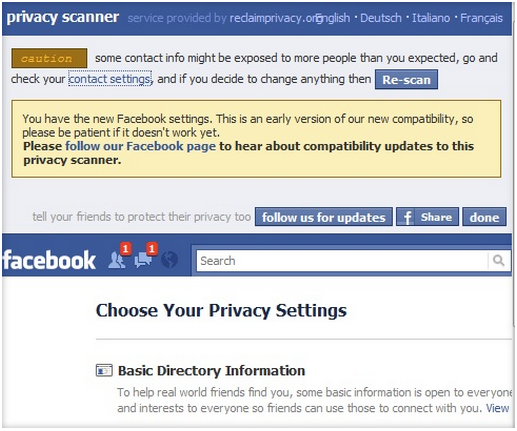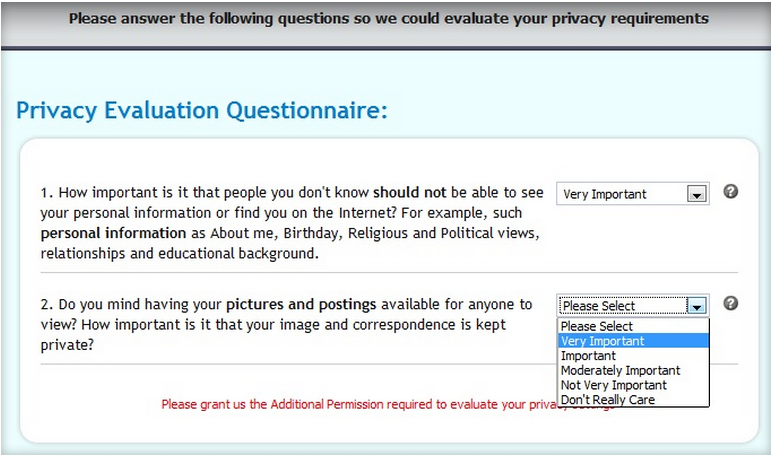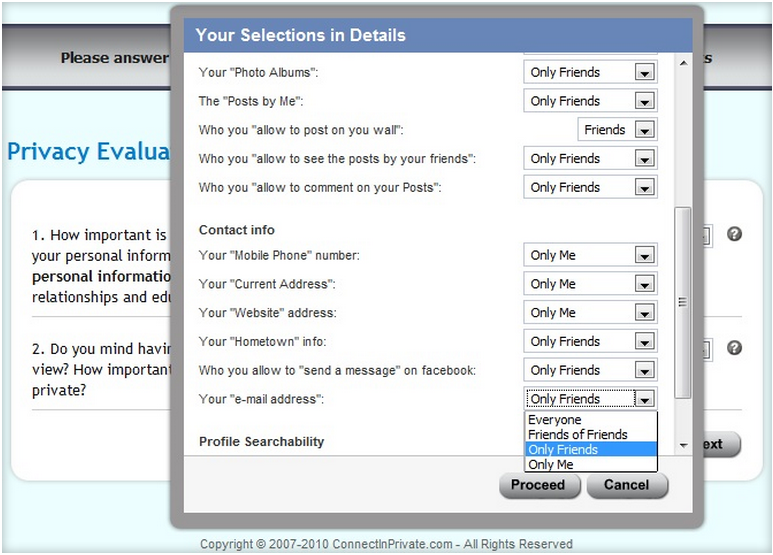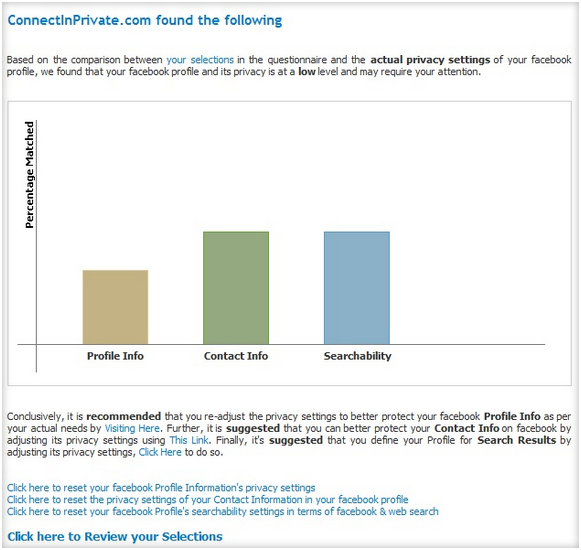Menu
Free Facebook privacy scanners help you lock down your account
When it comes to assessing your Facebook privacy risk, the quick and simple ReclaimPrivacy.org outshines the more invasive Secure My Profile.
ReclaimPrivacy.org's Facebook privacy scanner warns of potential security risks to your personal information.
Some people don't mind strangers rummaging through their Facebook friends lists, wall posts, status updates, and other details of their online selves. The rest of us attempt to control who has access to our Facebook information. The recent revamp of the Facebook privacy settings makes it simpler to adjust the many settings that determine whether and how people contact you, and how much of your information they can access.
Two free online scanners put your Facebook privacy settings to the test, though they take very different approaches to how they generate their ratings. ReclaimPrivacy.org gives you a Facebook security grade in seconds without asking for any information or permissions. You have to install Connect in Private's Secure My Profile Facebook app and allow the program to access your information and settings.
Secure My Profile gives you more granular control over how and with whom you share your Facebook activities, but the program also attempts to announce its presence to your friends. As soon as I saw that pop-up attempt to post an ad to my wall when the installation finished, I couldn't get the application off my PC fast enough.
Get a Facebook privacy rating in an instant
Testing your Facebook privacy settings with the ReclaimPrivacy.org scanner is a three-step process: drag the Scan for Privacy bookmark link from the service's home page to your browser's toolbar, open your Facebook Privacy settings, and click the Scan for Privacy bookmark. The scanner opens at the top of the browser window, and after a few seconds, an icon indicates Caution or Secure, along with a link to the Facebook settings it suggests you change. (The scanner appears in the screen at the top of this post.)
When I tested the scanner, the Caution alert persisted until I had reset the Facebook account's privacy options to nearly the most conservative possible. At these settings, only friends can interact with you in any way, and most of your personal information is hidden even from them.
Two free online scanners put your Facebook privacy settings to the test, though they take very different approaches to how they generate their ratings. ReclaimPrivacy.org gives you a Facebook security grade in seconds without asking for any information or permissions. You have to install Connect in Private's Secure My Profile Facebook app and allow the program to access your information and settings.
Secure My Profile gives you more granular control over how and with whom you share your Facebook activities, but the program also attempts to announce its presence to your friends. As soon as I saw that pop-up attempt to post an ad to my wall when the installation finished, I couldn't get the application off my PC fast enough.
Get a Facebook privacy rating in an instant
Testing your Facebook privacy settings with the ReclaimPrivacy.org scanner is a three-step process: drag the Scan for Privacy bookmark link from the service's home page to your browser's toolbar, open your Facebook Privacy settings, and click the Scan for Privacy bookmark. The scanner opens at the top of the browser window, and after a few seconds, an icon indicates Caution or Secure, along with a link to the Facebook settings it suggests you change. (The scanner appears in the screen at the top of this post.)
When I tested the scanner, the Caution alert persisted until I had reset the Facebook account's privacy options to nearly the most conservative possible. At these settings, only friends can interact with you in any way, and most of your personal information is hidden even from them.
You don't get a Secure rating in RleclaimPrivacy.org's scan until you've severely limited access to your Facebook information.
But sharing is what Facebook is all about. You can make yourself nearly invisible to all but a handful of Facebook friends, but for most people, that defeats the purpose. Part of the fun of Facebook is friending all sorts of people and enjoying the eclectic mix of status updates and other posts that are likely to scroll by at any given time.
The real value of the ReclaimPrivacy.org is that it prompts you to update your Facebook privacy settings. It seems every time I do, I end up making some change so I share a little less.
Facebook privacy app feels more like an invasion
Like many Facebook apps, you're prompted during installation of Connect in Private's Secure My Profile to grant the program permission to access your account. In fact, the scanner won't function unless you do so.
After the app finishes its initial privacy scan, it pops up a window offering to post a self-promoting ad to your wall and your friends' home pages. (Note that ReclaimPrivacy.org's scanner has a link for telling your friends about the service, but it's much less obtrusive than Secure My Profile's pop-up window.)
The real value of the ReclaimPrivacy.org is that it prompts you to update your Facebook privacy settings. It seems every time I do, I end up making some change so I share a little less.
Facebook privacy app feels more like an invasion
Like many Facebook apps, you're prompted during installation of Connect in Private's Secure My Profile to grant the program permission to access your account. In fact, the scanner won't function unless you do so.
After the app finishes its initial privacy scan, it pops up a window offering to post a self-promoting ad to your wall and your friends' home pages. (Note that ReclaimPrivacy.org's scanner has a link for telling your friends about the service, but it's much less obtrusive than Secure My Profile's pop-up window.)
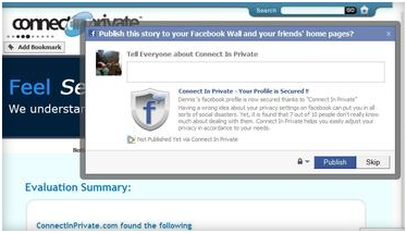
I declined the offer and continued the evaluation but made sure to uninstall the app as soon as it was finished. Maybe it's harsh to expect a freeware vendor not to advertise, but I prefer it do so somewhere other than my Facebook wall.
Before it runs the privacy scan, Secure My Profile asks you two general questions about how willing you are to share your personal information and your images and posts.
Before it runs the privacy scan, Secure My Profile asks you two general questions about how willing you are to share your personal information and your images and posts.
Secure My Profile asks you to rate your willingness to share Facebook information via five preset options.
Next, you're asked to set privacy preferences in more detail using Facebook's own presets: Everyone, Friends of Friends, Only Friends, and Only Me.
Decide on a case-by-case basis who is allowed to access your Facebook data via Connect in Private's Secure My Profile app.
After you make your selections, Secure My Profile presents a graph showing your rating for profile info, contact info, and searchability. If the ratings are low, you're prompted to reset your privacy options so they better match the preferences you set earlier.
Secure My Profile graphs your privacy rating in three Facebook categories: profile info, contact info, and searchability.
For me, Secure My Profile's comprehensive approach to rating your Facebook privacy is overkill. You can do almost as well by going through the privacy settings yourself, without having to install an application. Conversely, ReclaimPrivacy.org's straightforward approach makes up in speed and simplicity what it lacks in versatility.
